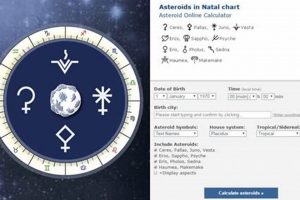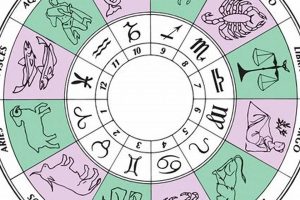In astrological practice, this celestial body represents committed partnerships, marriage, and long-term unions. It symbolizes the qualities an individual seeks in a life partner and the dynamics they bring to serious relationships. Its placement within a birth chart can illuminate an individual’s approach to commitment, the types of contracts they enter, and their experience of fairness and equality within partnerships.
Understanding this archetype can provide valuable insights into relationship patterns, highlighting potential strengths and challenges within committed bonds. Historically linked to the Roman goddess of marriage and childbirth, its astrological significance extends beyond romantic relationships to encompass any form of contractual agreement or balanced alliance. This celestial body’s influence can illuminate the dynamics of business partnerships, legal agreements, and even the pursuit of social justice. It reveals how individuals navigate shared resources and responsibilities.
Further exploration of this astrological element can delve into its aspects with other planets, its placement in different astrological houses, and its role in synastry the comparison of two individuals’ birth charts to assess relationship compatibility.
Tips for Understanding Committed Partnerships Through Astrological Placements
These insights offer guidance for navigating committed relationships using astrological placements. Analysis of this specific celestial body within a birth chart can provide valuable self-awareness and inform relationship dynamics.
Tip 1: Determine Placement: Locate this celestial body in the birth chart to understand its influence on relationship patterns. The sign and house it occupies offer significant information about the qualities sought in a partner and the areas where commitment is most prominent.
Tip 2: Analyze Aspects: Examine aspects between this celestial body and other planets to uncover potential challenges and opportunities within partnerships. Harmonious aspects may indicate ease and flow, while challenging aspects may suggest areas requiring attention and compromise.
Tip 3: Consider Synastry: Comparing the placement of this celestial body in two individuals’ birth charts can reveal the strengths and weaknesses of their compatibility. This technique can illuminate how each person approaches commitment and how their needs and expectations align.
Tip 4: Reflect on Past Relationships: Analyze past relationships through the lens of this celestial body’s placement. This reflection can reveal recurring patterns and provide insights into what creates lasting, fulfilling partnerships.
Tip 5: Embrace Self-Awareness: Use the insights gained from analyzing this celestial body’s placement to foster greater self-awareness regarding relationship needs and desires. This knowledge can empower individuals to make more conscious choices in their partnerships.
Tip 6: Seek Professional Guidance: Consult with a qualified astrologer for a personalized interpretation of this celestial body’s influence in a birth chart. A professional reading can offer deeper insights and guidance for navigating relationship challenges and maximizing compatibility.
By incorporating these tips, individuals can gain a deeper understanding of their approach to commitment and develop stronger, more fulfilling partnerships. Astrological awareness can empower individuals to build and maintain harmonious, balanced relationships.
This exploration of committed partnerships through astrological analysis provides a foundation for understanding the complexities of long-term relationships and fostering lasting connections.
1. Marriage
Within astrological interpretation, marriage represents a significant facet of Juno’s influence. It signifies not simply the legal contract but the underlying energetic dynamic of commitment, shared responsibility, and the quest for a lasting union. Juno’s placement in a birth chart can offer valuable insights into an individual’s predispositions toward marriage, including their expectations of a partner, their capacity for compromise, and potential challenges they may encounter in long-term committed relationships. For example, a prominent Juno in Cancer might suggest a strong desire for a nurturing, family-oriented marriage, while Juno in Aquarius might indicate a preference for a partnership based on intellectual connection and shared ideals. While Juno’s influence extends beyond legal marriage to encompass any committed partnership, its connection to the archetypal concept of marriage provides a valuable framework for understanding its role in long-term relationships.
Examining the aspects Juno forms with other planets can further illuminate the dynamics within a marriage. A harmonious aspect between Juno and Venus, for instance, might suggest a strong emphasis on love, affection, and shared values, potentially contributing to a harmonious marital life. Conversely, a challenging aspect between Juno and Saturn could indicate potential difficulties with commitment, restriction, or feelings of burden within the marriage. These astrological indicators offer potential insights into the dynamics of the marriage and highlight areas where individuals may need to focus their efforts to foster a healthy, sustainable partnership. Real-life examples, though anonymized for privacy, abound in astrological consultations, demonstrating how Juno’s placement correlates with marital experiences. Individuals with Juno conjunct their Sun often experience a strong sense of identity intertwined with their partnerships, while those with Juno square Pluto might face recurring power struggles or transformative experiences within their marriages.
Understanding the connection between Juno and marriage offers practical significance for individuals seeking to navigate the complexities of long-term commitment. By analyzing Juno’s placement and aspects in their birth chart, individuals can gain valuable self-awareness regarding their expectations, needs, and potential challenges within a marriage. This awareness can empower individuals to make conscious choices in their relationships, fostering greater understanding, communication, and ultimately, a more fulfilling and enduring marital union. While astrological insights offer valuable guidance, it is crucial to remember that individual agency and conscious effort play a pivotal role in shaping the trajectory of any marriage. Juno’s placement provides a map, but the journey of marriage is ultimately navigated by the individuals involved.
2. Commitment
Commitment represents a core principle within the astrological archetype of Juno. This celestial body’s placement within a birth chart illuminates an individual’s capacity for, approach to, and experiences within committed partnerships. Juno does not dictate the presence or absence of commitment, but rather reveals the individual’s unique energetic blueprint for navigating long-term relationships. Its influence extends beyond romantic partnerships to encompass any form of binding agreement or shared responsibility, including business partnerships, familial obligations, and even commitments to personal values and ideals. The placement of Juno can indicate the types of commitments an individual is most drawn to, the challenges they might encounter in maintaining them, and the lessons they are likely to learn through these experiences.
The sign and house placement of Juno provide nuanced insights into the nature of commitment sought by an individual. For example, Juno in Capricorn might indicate a preference for traditional, structured commitments built on responsibility and longevity, while Juno in Gemini could suggest a preference for commitments based on intellectual connection and shared communication. Aspects between Juno and other planets further refine the understanding of commitment within the individual’s life. A harmonious trine between Juno and Saturn, for instance, could suggest a natural ease with commitment and a responsible approach to long-term partnerships, whereas a challenging square between Juno and Uranus might indicate a tendency toward sudden disruptions or unexpected changes within commitments. Observing these placements in conjunction with real-life examples reveals consistent patterns. Individuals with Juno in Taurus often demonstrate a strong commitment to stability and security within their relationships, while those with Juno in Aries might prioritize independence and individual expression within their commitments.
Understanding the interplay between Juno and commitment offers profound insights into navigating interpersonal dynamics. This knowledge can empower individuals to recognize their unique strengths and weaknesses within committed partnerships, facilitating more conscious choices and ultimately, more fulfilling relationships. It is crucial to remember, however, that astrological placements offer guidance, not predetermined outcomes. While Juno can illuminate potential challenges related to commitment, it simultaneously provides a roadmap for personal growth and the development of stronger, more resilient bonds. By integrating these astrological insights with conscious self-awareness, individuals can cultivate greater understanding, build trust, and foster lasting commitment in their lives.
3. Partnership
Within the framework of astrological interpretation, partnership stands as a central theme interwoven with the significance of Juno. This celestial body’s placement offers valuable insights into an individual’s approach to partnerships, illuminating their preferences, strengths, and potential challenges within various forms of committed relationships. Juno’s influence extends beyond romantic partnerships to encompass business collaborations, familial bonds, and even the dynamics of social interactions. Understanding Juno’s role in partnership provides a framework for navigating interpersonal connections with greater awareness and fostering more fulfilling, balanced relationships.
- Equality and Fairness
Juno emphasizes the importance of equality and fairness within partnerships. Its placement can reveal how an individual seeks balance and reciprocity in their relationships. For example, Juno in Libra often signifies a strong need for harmony and justice within partnerships, while Juno in Aries might suggest a more independent and assertive approach. Real-life examples demonstrate how individuals with Juno in Virgo often prioritize practical support and mutual service in their partnerships, whereas those with Juno in Leo may value recognition and appreciation. The pursuit of equitable dynamics becomes a central theme in partnerships influenced by Juno’s placement.
- Negotiation and Compromise
Juno’s influence highlights the role of negotiation and compromise in successful partnerships. Its placement can indicate an individual’s capacity for navigating disagreements and finding mutually beneficial solutions. Juno in Scorpio, for instance, might suggest a tendency toward intense negotiations and transformative compromises, while Juno in Pisces might indicate a more empathetic and adaptable approach. Observing individuals with Juno in Capricorn often reveals a preference for structured agreements and clearly defined roles within partnerships, whereas those with Juno in Sagittarius might prioritize flexibility and shared exploration. The ability to navigate differences and reach compromises becomes crucial for sustained harmony in Juno-influenced partnerships.
- Shared Goals and Values
Juno’s placement sheds light on the importance of shared goals and values within partnerships. It can reveal the areas where individuals seek alignment and common ground with their partners. Juno in Aquarius often signifies a preference for partnerships based on shared ideals and intellectual stimulation, while Juno in Taurus might emphasize the importance of shared security and material stability. Real-life examples demonstrate how individuals with Juno in Gemini often prioritize communication and intellectual exchange in partnerships, whereas those with Juno in Cancer might value emotional connection and shared nurturing. The presence of shared goals and values contributes significantly to the longevity and fulfillment of Juno-influenced partnerships.
- Growth and Evolution
Juno’s influence on partnerships extends beyond the initial stages of connection to encompass the potential for growth and evolution within the relationship. Its placement can indicate how individuals learn and develop through their partnerships, and the types of transformations they might undergo. Juno in Sagittarius, for example, could signify a desire for shared exploration and expansion within partnerships, while Juno in Capricorn might suggest a focus on building lasting structures and achieving long-term goals together. Individuals with Juno in Pisces often experience profound emotional growth and spiritual development through their partnerships, whereas those with Juno in Virgo may prioritize practical improvement and mutual support for personal growth. The potential for growth and evolution becomes a defining characteristic of partnerships shaped by Juno’s influence.
These interconnected facets of partnership, as illuminated by Juno’s placement, offer a comprehensive understanding of how individuals navigate committed relationships. By recognizing the significance of equality, compromise, shared values, and growth within partnerships, individuals can cultivate stronger, more fulfilling connections. Juno’s influence serves as a guide, highlighting the potential for both challenges and rewards within the intricate landscape of interpersonal dynamics. Ultimately, Juno encourages a conscious approach to partnerships, emphasizing the importance of mutual respect, understanding, and the ongoing pursuit of balanced, harmonious connections.
4. Balance
Balance represents a core principle within the astrological interpretation of Juno. This celestial body’s placement illuminates an individual’s inherent drive for equilibrium within committed partnerships. Understanding this facet of Juno provides valuable insights into relationship dynamics, revealing how individuals seek harmony, negotiate power dynamics, and strive for equitable distribution of responsibilities within their closest bonds.
- Give and Take
Juno’s influence highlights the importance of reciprocity in relationships. A balanced partnership, as indicated by Juno’s placement, requires a healthy exchange of giving and receiving. Juno in Libra, for example, often emphasizes the need for fairness and mutual consideration, while Juno in Taurus might prioritize material security and shared resources. Real-life examples demonstrate individuals with Juno in Virgo often express balance through acts of service and practical support, while those with Juno in Leo might seek recognition and appreciation. The dynamic interplay of giving and receiving becomes crucial for maintaining equilibrium within Juno-influenced partnerships.
- Power Dynamics
Juno’s placement can reveal how an individual navigates power dynamics within relationships. A balanced partnership, in this context, involves equitable distribution of power and a shared sense of agency. Juno in Scorpio, for instance, often signifies a need for transformative power sharing within relationships, while Juno in Aquarius might emphasize egalitarianism and mutual respect. Observing individuals with Juno in Capricorn often reveals a preference for clearly defined roles and responsibilities within partnerships, whereas those with Juno in Sagittarius might prioritize shared exploration and freedom. Negotiating power dynamics effectively becomes essential for achieving balance in Juno-influenced relationships.
- Emotional Equilibrium
Juno’s influence extends to the emotional realm, highlighting the importance of emotional equilibrium within partnerships. A balanced partnership, as understood through Juno, involves a healthy expression of emotions, empathy, and mutual support. Juno in Cancer, for example, often emphasizes the need for emotional security and nurturing within relationships, while Juno in Pisces might suggest a deep sense of empathy and compassion. Individuals with Juno in Gemini often express emotional balance through open communication and intellectual exchange, whereas those with Juno in Aries might prioritize individual expression and directness. Maintaining emotional equilibrium becomes vital for creating a stable and harmonious Juno-influenced partnership.
- Shared Responsibilities
Juno’s placement can offer insights into how individuals approach shared responsibilities within partnerships. A balanced partnership, from Juno’s perspective, involves an equitable distribution of tasks, obligations, and contributions. Juno in Virgo often signifies a meticulous approach to shared responsibilities, emphasizing practicality and efficiency, while Juno in Capricorn might suggest a focus on long-term goals and structured planning. Individuals with Juno in Libra often strive for fairness and mutual agreement in dividing responsibilities, whereas those with Juno in Leo might value recognition for their contributions. Navigating shared responsibilities effectively becomes essential for maintaining balance and preventing resentment within Juno-influenced partnerships.
These interconnected aspects of balance, as illuminated by Juno’s placement, offer a comprehensive understanding of how individuals strive for equilibrium within their committed partnerships. By recognizing the interplay of give and take, power dynamics, emotional equilibrium, and shared responsibilities, individuals can cultivate stronger, more harmonious relationships. Juno’s influence serves as a guide, highlighting the importance of fairness, mutual respect, and the ongoing pursuit of balance within the complex dynamics of interpersonal connection.
5. Fairness
Fairness represents a cornerstone of Juno’s astrological significance, particularly within the context of committed partnerships. Juno’s placement within a birth chart illuminates an individual’s inherent sense of justice and the importance they place on equitable dynamics within relationships. This focus on fairness influences expectations of reciprocity, negotiation styles, and responses to perceived imbalances within partnerships. A strong Juno placement often correlates with a heightened sensitivity to injustice and a deep-seated need for balanced exchanges within interpersonal connections. Consequently, relationships lacking fairness can become a source of significant discord for individuals with prominent Juno placements. This can manifest as resentment, conflict, or a sense of dissatisfaction if contributions, power dynamics, or emotional investments feel unequal. For example, individuals with Juno in Libra often exhibit a pronounced need for harmony and balance, experiencing discomfort in relationships characterized by inequitable distribution of responsibilities or unequal power dynamics. Conversely, those with Juno in Aries might prioritize individual autonomy within partnerships, potentially challenging perceived injustices directly and advocating for their own needs with greater assertiveness. These varied expressions underscore fairness as a multifaceted concept shaped by Juno’s interplay with other astrological factors.
Real-life examples further demonstrate this connection. Consider a scenario where an individual with Juno conjunct Saturn experiences repeated instances of unmet expectations or inequitable distribution of responsibilities within a partnership. This individual might react with a sense of restriction, duty, or resentment, feeling burdened by the perceived unfairness. Alternatively, someone with Juno trine Neptune might approach imbalances with greater compassion and understanding, seeking to dissolve conflict through forgiveness and spiritual reconciliation. These diverse responses highlight the nuanced interplay between Juno’s placement, individual personality, and external circumstances. Practical application of this understanding involves recognizing one’s own sensitivities to fairness, communicating needs effectively, and setting healthy boundaries within relationships. This awareness can empower individuals to navigate conflict constructively, fostering greater understanding and mutual respect within partnerships. Recognizing how others prioritize fairness based on their Juno placements facilitates empathy and promotes more balanced interactions.
In essence, Juno’s influence underscores fairness as an essential ingredient for healthy, sustainable partnerships. Navigating relationship dynamics through the lens of fairness, as revealed by Juno, can lead to greater self-awareness, improved communication, and ultimately, more fulfilling connections. Addressing potential challenges related to perceived unfairness directly, with sensitivity and open communication, becomes crucial for maintaining harmonious, balanced relationships. This focus on fairness, as a key component of Juno’s astrological influence, ultimately contributes to a deeper understanding of the complexities of interpersonal dynamics and the pursuit of equitable, mutually beneficial partnerships.
6. Betrayal
Betrayal cuts to the core of Juno’s astrological significance, representing a profound disruption of the trust and commitment essential for healthy partnerships. Juno’s placement in a birth chart can illuminate an individual’s sensitivity to betrayal, potential responses, and the transformative potential embedded within such experiences. While Juno does not inherently predict betrayal, its position offers insights into how individuals might perceive and process these challenging events within the context of committed relationships. Betrayal, as viewed through the lens of Juno, transcends mere infidelity, encompassing any breach of trust, broken vows, or violation of the fundamental principles of fairness and equality within a partnership. This can manifest as dishonesty, manipulation, abandonment, or any action that undermines the foundation of trust upon which the relationship rests. Understanding Juno’s influence helps interpret the specific sensitivities surrounding betrayal for each individual. For example, individuals with Juno in Scorpio might experience betrayal as a deeply transformative crisis, leading to profound emotional shifts and a potential for intense reclamation of personal power. Conversely, those with Juno in Pisces might process betrayal through a lens of compassion and forgiveness, seeking understanding and spiritual healing. The house placement of Juno further refines this interpretation, indicating the specific areas of life where betrayal might have the most significant impact. Juno in the 7th house, for instance, could suggest heightened sensitivity to betrayal within romantic partnerships, while Juno in the 10th house might indicate vulnerability to betrayal in professional or public contexts.
Real-life examples demonstrate the multifaceted nature of betrayal as experienced through the lens of Juno. An individual with Juno conjunct Pluto might experience betrayal as a catalyst for profound personal transformation, leading to a dismantling of old patterns and a reassertion of individual power. In contrast, someone with Juno square Uranus might react to betrayal with sudden detachment and a desire to sever ties abruptly. These varied responses highlight the individual nature of experiencing and processing betrayal. Furthermore, examining Juno’s aspects to other planets offers additional insights. A challenging aspect between Juno and Neptune, for instance, might indicate a susceptibility to deception or illusion within relationships, potentially increasing vulnerability to betrayal. Conversely, a harmonious aspect between Juno and Jupiter could suggest a capacity for growth and resilience in the face of betrayal, finding opportunities for learning and expansion even amidst challenging circumstances. The practical significance of this understanding lies in developing coping mechanisms and fostering resilience within relationships. Recognizing one’s own sensitivities to betrayal allows for proactive communication, establishment of healthy boundaries, and conscious choices in selecting partners aligned with values of trust and integrity.
In conclusion, betrayal, as interpreted through Juno’s astrological influence, presents a complex and deeply personal experience. While challenging, these experiences hold the potential for profound growth, self-discovery, and a deeper understanding of one’s own needs and expectations within relationships. Navigating the aftermath of betrayal requires self-compassion, honest reflection, and a willingness to learn from the experience. Ultimately, Juno’s wisdom offers guidance for transforming the pain of betrayal into an opportunity for greater self-awareness and the creation of stronger, more authentic connections in the future. Addressing the potential for betrayal proactively, with open communication and mutual respect, strengthens the foundation of trust upon which lasting partnerships are built.
Frequently Asked Questions
This section addresses common inquiries regarding this astrological archetype, offering concise and informative responses.
Question 1: How does its placement differ from Venus in a birth chart?
While Venus represents attraction and the experience of romance, this celestial body signifies the qualities sought in a long-term partner and the dynamics of commitment itself.
Question 2: Does a challenging aspect to this celestial body indicate inevitable relationship difficulties?
Not necessarily. Challenging aspects indicate potential areas of friction requiring conscious effort and compromise within partnerships, not insurmountable obstacles.
Question 3: Can its placement reveal potential compatibility issues with a partner?
Comparing its placement in two individuals’ birth charts (synastry) can illuminate potential areas of harmony and discord within the relationship.
Question 4: Does its retrograde motion hold specific significance?
Retrograde motion suggests an internalization of the themes of partnership and commitment, potentially leading to deeper reflection on relationship patterns.
Question 5: How can individuals use this astrological information to improve their relationships?
Increased self-awareness regarding relationship needs and patterns can facilitate more conscious choices and foster healthier dynamics within partnerships.
Question 6: Is its placement the sole determinant of relationship success?
No. While its placement offers valuable insights, relationship success depends on numerous factors, including individual choices, communication, and mutual effort.
Understanding these key aspects of this astrological archetype provides a valuable framework for navigating the complexities of committed partnerships. This knowledge empowers individuals to approach relationships with greater awareness and intentionality.
Further exploration of this topic can delve into specific case studies, demonstrating its practical application within individual birth chart interpretations.
Juno in Astrology
This exploration of Juno in astrology has illuminated its multifaceted influence on committed partnerships, highlighting its significance in understanding relationship dynamics, the pursuit of balance, and the complexities of commitment. From marriage and fairness to betrayal and growth, Juno’s placement within a birth chart offers valuable insights into an individual’s unique approach to long-term relationships. Its interplay with other astrological factors adds further depth to this understanding, revealing nuanced patterns and potential challenges within partnerships. By examining Juno’s role in various relationship contexts, a clearer picture emerges of its importance in navigating the intricacies of interpersonal connection and the ongoing pursuit of fulfilling, balanced unions.
Ultimately, Juno’s astrological significance lies in its capacity to empower individuals with self-awareness and a deeper understanding of their relationship needs and patterns. This knowledge provides a framework for making more conscious choices, fostering healthier communication, and cultivating stronger, more resilient bonds. While Juno’s placement offers valuable guidance, individual agency and mutual effort remain crucial for navigating the dynamic landscape of committed partnerships. Through continued exploration and application of these astrological insights, individuals can embark on a journey of self-discovery and cultivate more fulfilling, balanced relationships grounded in mutual respect, understanding, and a shared commitment to growth.







